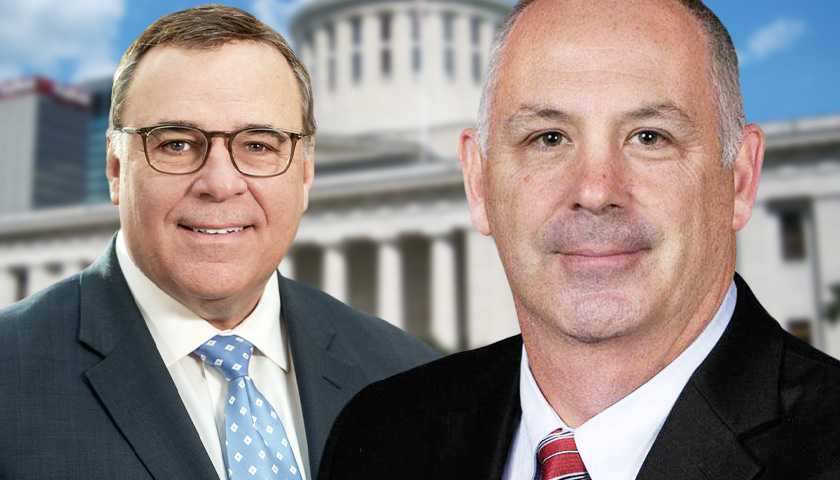Two Republican state lawmakers in Ohio have introduced a bill to change the state’s medical marijuana regulations, which would allow more people to use cannabis for medicinal purposes and establish a new state agency to manage the program.
Senate Bill (SB) 9, sponsored by State Senators Steve Huffman (R-Tipp City) and Kirk Schuring (R-Canton), is similar to another proposal from the previous legislative session, SB 261, which was passed by the Ohio Senate in December 2021 but was defeated in the Ohio House of Representatives.
Both bills aim to modernize Ohio’s 2016 medical marijuana program, which was approved by the General Assembly and became a law. The Division of Marijuana Control, a new state agency, would be established as part of the Ohio Department of Commerce under the proposed legislation to oversee the state’s medical marijuana program. The legislation also establishes a 13-member panel that supervises the new organization and the healthcare program. Currently, the State Medicinal Board of Ohio, the Ohio Board of Pharmacy, and the Ohio Department of Commerce are in charge of regulating the state’s medical marijuana program.
“What we’ve found is that many of the growers want to expand and grow more. There’s more growers, there’s more demand. They put an application into the Department of Commerce, and it sits there for 18 months, two years. Hopefully, this takes the bureaucracy out of this and streamlines things and make it a better-functioning industry,” Huffman said.
A patient would be eligible to consume cannabis medicinally in the state if they also have autistic spectrum disorder, arthritis, migraines, persistent muscular spasms, or opioid use disorder. More than two dozen significant medical diseases, such as cancer, chronic pain, AIDS, Parkinson’s disease, PTSD, and fatal illnesses, are currently on the list of qualifying ailments.
The proposed law also permits persons with other severe medical problems, as assessed by their doctor and treatable with medicinal cannabis, to consume marijuana for medical purposes. A similar clause in the prior law permitted patients to take medical marijuana if a physician determined that “the patient’s symptoms may reasonably be expected to be relieved from medical marijuana.”
Huffman and Schuring informed their colleagues during a committee hearing on Tuesday that many Ohio medical marijuana patients cross state lines to buy marijuana from nearby states with more lenient marijuana laws. According to data from state officials, as of January 1, less than 164,000 of the more than 320,000 patients registered in Ohio’s medical marijuana program had a current doctor’s recommendation and patient registration.
“The largest dispenser for Ohioans is in Michigan. We need to turn that around, and make it more friendly, so people come here and they have a safe, viable product,” Huffman said.
SB 261 would have let the state’s authorized medicinal marijuana growers extend their business activities. Even though the current measure does not have any provisions to raise the square footage of permissible cultivation space, Huffman stated he is open to changing the law to incorporate the larger growing area.
“In my discussions with Senator Schuring, we felt this would be a positive move and positive change for the industry. At the same time hopefully members of the House will be comfortable with it,” Huffman said.
According to The Recovery Center, a study released in October 2012 found that individuals treated for addiction to marijuana had a higher mortality rate than those with diagnoses related to cocaine or alcohol but lower than those with methamphetamine or opioid-related disorders.
The Substance Abuse and Mental Health Services Administration (SAMHSA) states that studies link marijuana use to depression, anxiety, suicide planning, and psychotic episodes. They do not know, however, if marijuana use is the cause of these conditions.
The Republican Study Committee (RSC), a 156-member GOP House Caucus, unveiled the Family Policy Agenda in September of last year, which includes a “danger of drugs” section entirely about cannabis legalization and how it leads to violent crime and suicide.
“Congress should not legalize marijuana, while also taking steps to constrain this new industry’s ability to harm children. At the very least, Congress should direct the CDC to gather data and conduct studies on the health impacts of THC use during childhood and early adolescence with a special focus on deaths by suicide and those involved in violent crime to provide Congress and the public with further information about these dangers,” the Family Policy Agenda reads.
In 2015, Ohio voters defeated an initiated constitutional amendment that would have legalized the limited sale and use of marijuana and created 10 facilities with exclusive commercial rights to grow marijuana. The vote margin was 63.65 percent to 36.35 percent. ResponsibleOhio PAC sponsored the initiative.
The conservative Center for Christian Virtue says they will fight efforts to legalize cannabis in Ohio. Its leader, Aaron Baer, said the group opposed the failed 2015 attempt to legalize pot and will fight again.
“The marijuana industry is not going to be able to fool another state, is not going to be able to fool Ohioans with their lies and their empty promises of what marijuana will do for our state. The tax revenue is not true. The harmless effect of it is not true. The reality, it brings devastation,” Baer said.
Governor Mike DeWine has already said that he will veto a measure to legalize marijuana, even if lawmakers do decide to pursue it this session.
Given the problems caused by other substances, such as driving under the influence, “I think it’s ridiculous to add an additional problem,” DeWine said.
In November, five Ohio cities approved local marijuana decriminalization ballot initiatives during the midterm election.
Marijuana and THC remain illegal at the federal level, even though many states have legalized their use.
– – –
Hannah Poling is a lead reporter at The Ohio Star and The Star News Network. Follow Hannah on Twitter @HannahPoling1. Email tips to [email protected]
Photo ” Steve Huffman” by Ohio State Senator Steve Huffman. Photo “Kirk Schuring” by The Ohio Senate. Background Photo “Ohio Statehouse” by tlarrow. CC BY-SA 2.0.





